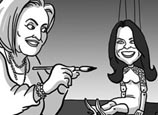
This can be proved by the statement of the new U.S. secretary of state. Kerry expounded his pragmatic ideas on international affairs at the confirmation hearing for the post of secretary of state held by the U.S. Senate Committee on Foreign Relations on Jan. 24. When asked how to press China on economic and trade issues, Kerry stressed it is critical to strengthen ties with China.
“We need to establish rules of the road that work for everybody,” he said. “On things like intellectual property, market access, and currency, there are still significant challenges ahead with China.” In other words, the United States will continue to press China on these issues.
Trade card
The degree of U.S. trade enforcement against China depends on the condition of U.S. economy.
David J. Leiter, president of ML Strategies, a government relations consulting group, said that the Obama administration will continue to pay great attention to trade issues, and its efforts in this regard will be focused on China, the Trans-Pacific Partnership (TPP) negotiations, and resumption of free trade talks with the European Union. He added that Obama will seek to boost ties with China as well as other emerging market countries such as India and Brazil by bringing forward balanced trade proposals.
Leiter believes that trade tensions between China and the United States may continue in 2013, and will be centered on tariffs, barriers to services trade, intellectual property protection, investment restrictions, China’s state-owned enterprises, restrictions on exports of certain raw materials, and the yuan’s exchange rate.
It has been proved over the past several decades that cooperation and development are the themes of China-U.S. trade relations, and friction will not change the fundamentals of China-U.S. cooperation.
Read the Chinese version: 美国新思路:外交政策即经济政策, source: People's Daily
 |
















 Police dog on duty for first time in Chengdu
Police dog on duty for first time in Chengdu


![]()
